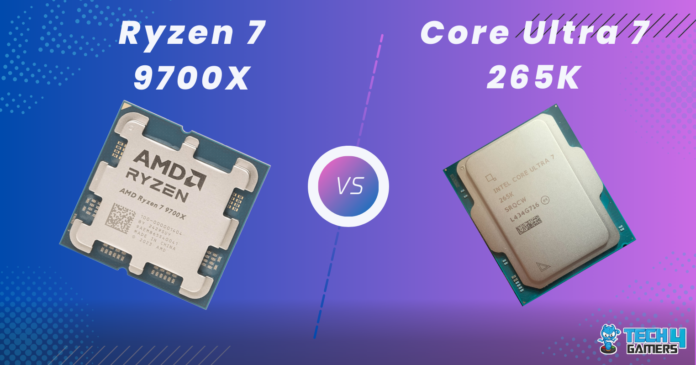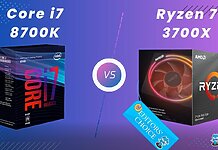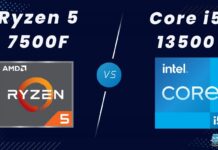AMD Ryzen 7 9700X Rated: 8/10 Intel Core Ultra 7 265K Rated: 7.5/10
Pros And Cons
| CPU | Pros | Cons |
|---|---|---|
| Core Ultra 7 265K | ✅ Has 12 more physical cores ✅ More modern manufacturing process | ❌ Worse in terms of performance |
| Ryzen 7 9700X | ✅ Has 20 MB larger L3 cache size ✅ Better in terms of performance | ❌Much more expensive |
Comparison Table
| Feature | Core Ultra 7 265K | Ryzen 7 9700X |
|---|---|---|
| Codename | Arrow Lake | Zen 5 (Granite Ridge) |
| Model number | 265K | - |
| Integrated GPU | Arc Xe2 (Arrow Lake-S) | Radeon Graphics |
| Fabrication Process | 3 nm | 4 nm |
| Socket | FCLGA-1851 | AM5 |
| Memory Size | 192 GB | 192 GB |
| Best Motherboards | - | Best Motherboards For Ryzen 7 9700X |
| Best RAM | - | Best RAM For Ryzen 9700X |
| Processor Review | - | AMD Ryzen 7 9700X Review |
Architectural Differences
- Core Count: The Core Ultra 7 265K has 20 cores (8 P-cores and 12 E-cores) and 20 threads, the Ryzen 7 9700X only has 8 cores and 16 threads.
- Clock Speed: The base clock of the Core Ultra 7 265K is 3.9GHz, whereas the base clock on the 9700X is about 3.8GHz. The boost clock on the Intel chip is 5.4GHz, whereas the Ryzen boosts to up to 5.5GHz.
- Process Node: The Intel chips boast a 3nm manufacturing process, whereas the 9700X has a slightly older 4nm process.
- TDP: The Core Ultra 7 265 K’s PL1 TDP is around 125 watts, while the 9700X has a much lower TDP of only 65 watts.
- Cache: Intel’s Core Ultra 7 265K processor uses 30MB of shared L3 cache, which is slightly lower than the 9700X’s 32 MB.
Intel’s Core Ultra line of products has proven to be quite a departure from their regular Core lineup. To see how they differ from the rest of the market, we will compare the features of the Core Ultra 7 265K vs Ryzen 7 9700X in the comparison below.
Gaming Benchmarks – 1080p
The most important distinction between any processor and the average consumer is how they perform in games. To test this, we have devised a carefully constructed test bench for both processors in this comparison, the specs of which you can read below:
Test Bench
- OS – Windows 11
- CPU Cooler – Enermax LiqMaxFlo 360mm
- Graphics Card – GIGABYTE RTX 4090 Gaming OC 24G
- SSD – XPG Gammix S50 Lite
- Power Supply – be quiet! Dark Power Pro 13 1300W
- Mobo (AMD) – ASRock X870E Taichi Lite
- Mobo (Intel) – MSI MPG Z890 Edge Ti WiFi Review
Star Wars Jedi: Survivor

- The first game of our testing had an average framerate of 161 FPS on the Ryzen 7 9700X, whereas the Core Ultra 7 was about 10% slower with a framerate of 146 FPS.
- The minimums differed by around 9% in Star Wars Jedi: Survivor. The 9700X had a framerate of around 140 FPS, whereas the Core Ultra 7 265K had around 128 FPS.
The Last Of Us Part 1

- The 265K was ahead by around 7% in The Last Of Us Part 1. The Ryzen 7 9700X had an average framerate of 180 FPS, whereas the Intel chip hovered closer to about 193 FPS.
- The Intel processor stayed ahead when it came to the 1% lows as well, where it had a framerate of around 136 FPS, whereas the 9700X hovered closer to around 118 FPS.
Cyberpunk 2077

- The 9700X stepped out in front by around 9.5% in this test as well, where it had an average framerate of around 162 FPS, while the Intel chip hung around about 148 FPS.
- We saw a difference of around 8% in the 1% lows, where the Ryzen 7 9700X had a framerate of 122 FPS, whereas the Core Ultra 7 265K had a minimum framerate of around 113 FPS.
Hogwarts Legacy

- The 9700X’s average framerate in Hogwarts Legacy was around 125 FPS, which is about 5% higher than the 119 FPS of the Core Ultra 7 265K.
- Things took a turn in the minimum framerates. The Core Ultra 7 265K had a framerate of around 83 FPS, whereas the Ryzen 7 9700X was about 12% slower, at around 74 FPS.
Remnant 2

- In our test of Remnant 2, the Ryzen 7 9700X had an average framerate of 126 FPS, which was about 8% higher than the 117 FPS we saw when testing the Core Ultra 7 265K.
- The 1% lows were almost equivalent on the two chips, with the 9700X hovering around a minimum of 104 FPS, whereas the Core Ultra 7 265K got 103 FPS.
Homeworld

- The 9700X ran Homeworld 3 about 10% better, with an average framerate of around 93 FPS, whereas the Core Ultra 7 265K hovered closer to an average of 84 FPS.
- The minimum framerates were hugely different in Homeworld 3. The 9700X achieved around 47 FPS, around 68% higher than the 28 FPS achieved by the Core Ultra 7 265K.
A Plague Tale: Requiem

- This game ran at an average framerate of 162 FPS, which was 33% higher than the 121 FPS that the Core Ultra 7 got.
- The minimum framerates were also 64% apart, with the 9700X hovering around 120 FPS, whereas the Core Ultra 7 265K got a framerate of about 73 FPS.
Hitman 3

- Finally, the 265K took the lead in the final game of our testing, with an average of about 256 FPS, whereas the 9700X was about 6% behind, with an average of 241 FPS.
- The 1% lows in Hitman 3 were higher on the Intel chip at around 232 FPS, while the 9700X got minimums of 214 FPS.
Productivity Benchmarks
To show the complex workflows of some users with their computers, we have devised a suite of productivity benchmarks that compare the Core Ultra 7 265K vs Ryzen 7 9700X performance in various tests. The following tests were conducted using the same test bench as the gaming benchmarks.
Cinebench

- The single-core performance between these two chips differed by only 6%, with the 9700X getting about 136 points, while the 265K had a performance of 145 points.
- The multi-core score was a whopping 80% better on the Core Ultra, which scored 2165 points, while the Ryzen hovered closer to 1201 points.
7-Zip

- The compression test ran better on Intel, scoring 182 points, which was 47% higher than the 124 points that the Ryzen mustered.
- Decompression also ran better on the Intel chip, at about 176 points, which was around 27% higher than the 9700X’s 138 points.
Photoshop

- The 9700X took the lead in this test. In our testing with the Pudget systems benchmark in Photoshop, it scored 26% higher than the Core Ultra 7 265 K.
- The 265K scored about 9246 points, whereas the Ryzen 7 9700X scored about 11647 points.
Overall Performance
| Processor | Ryzen 7 9700X | Core Ultra 7 265K |
|---|---|---|
| Average FPS | 📈156.25 | 📈148 |
| 1% Lows | 📉117.37 | 📉112 |
| Productivity (Rating) | ✏️7/10 | ✏️6.3/10 |
| Winner: AMD Ryzen 7 9700X | ||
Average Framerate
The Ryzen 7 9700X was advantageous in most games we tested. Games like A Plague Tale: Requiem ran much smoother on this chip than the Core Ultra 7 265K. The 265K punched back in some games, resulting in an average of 5.5% improvement from the Intel chip to the Ryzen.
1% Lows
The back-and-forth was greater in the 1% lows, where the 9700X was only about 4.8% faster than the Core Ultra 7 265K, but some games, like our test of Homeworld 3 and A Plague Tale: Requiem, were noticeably smoother on the Ryzen processor.
Productivity
All the productivity tests, except Photoshop, ran better on the Intel chip and by a wide margin. The biggest difference was in the Cinebench Multi-core, where the Intel chip had almost twice the score of the Ryzen. However, Photoshop ran noticeably better on the Ryzen chip, so take these readings as you will.
Power Consumption
| Game | Ryzen 7 9700X | Core Ultra 7 265K |
|---|---|---|
| Star Wars Jedi: Survivor | 95 | 123 |
| The Last Of Us Part 1 | 94 | 117 |
| Cyberpunk 2077 | 95 | 131 |
| Hogwarts Legacy | 90 | 115 |
| Remnant 2 | 88 | 123 |
| Homeworld 3 | 94 | 135 |
| A Plague Tale: Requiem | 91 | 122 |
| Hitman 3 | 88 | 104 |
| Average Power Draw | 91.87⚡ | 121.25⚡ |
| Winner: Ryzen 7 9700X | ||
Though Intel has made efforts to reduce power consumption as much as possible, AMD still takes the cake in this section. It consumes about 25% less power while still maintaining excellent performance.
Temperatures
| Game | Ryzen 7 9700X | Core Ultra 7 265K |
|---|---|---|
| Star Wars Jedi: Survivor | 76 | 68 |
| The Last Of Us Part 1 | 66 | 64 |
| Cyberpunk 2077 | 73 | 66 |
| Hogwarts Legacy | 78 | 78 |
| Remnant 2 | 63 | 67 |
| Homeworld 3 | 62 | 65 |
| A Plague Tale: Requiem | 70 | 68 |
| Hitman 3 | 75 | 76 |
| Average Temperatures | 70.37🌡️ | 69🌡️ |
| Winner: Core Ultra 7 265K | ||
The difference between the temperatures of these two chips was negligible. The delta was only about 2%, and both processors did not get alarmingly hot in our testing. Both chips maintained safe temperature ranges, and temperatures should not be a concern when buying either CPU.
Price And Value
| CPU | Ryzen 7 9700X | Core Ultra 7 265K | Price Difference |
|---|---|---|---|
| Launch MSRP | 💲449 | 💲394 | 13.96% |
| Current Price | 💲399 | 💲384 | 3.91% |
The price of these chips as of Late November 2024 is slightly different, though this is subject to change in the future. The 9700X is $15 more expensive than the Core Ultra 7 265K, a difference we will discuss in a moment.
What We Recommend
Core Ultra 7 265K: This processor performed worse in our testing in about all metrics except for multi-core performance. It had slightly worse gaming performance and noticeably worse power consumption, which are the two things consumers care the most about.
Ryzen 7 9700X: This processor stood out more than the Core Ultra 7 265K in our testing. It performed better when we ran games on both and miraculously consumed less power than its competition. Though not at the same level as some other AMD chips, the 9700X is a good chip.
If we had to recommend a processor between these two based on our testing, we would tell you to get the 9700X if gaming is a priority or if you have an AM5 computer set up. The 265K works for people who want a lot of multi-core performance.
If your primary purpose is gaming and your budget allows it, the X3D chips are excellent when compared to the rest of the market. The Core Ultra 7 265K uses the FCLGA-1851 socket. Yes, the Core Ultra 7 265K and the Ryzen 7 9700X both support ECC memory. The Core Ultra 7 265K has 24 PCIe lanes. The Ryzen 7 9700X has 28 PCIe lanes, 4 more than the 265K. FAQs
More From Ryzen 7 9700X More From Core Ultra 7 265K
Thank you! Please share your positive feedback. 🔋
How could we improve this post? Please Help us. 😔
[Comparisons Specialist]
I’m a passionate computer hardware expert specializing in CPUs and GPUs. With a lifelong curiosity for hardware and extensive hands-on experience, I provide valuable insights, practical advice, and in-depth analysis on these components. Engaging with the hardware community, I exchange knowledge and stay at the forefront of technological advancements.
Get In Touch: uzair@tech4gamers.com








